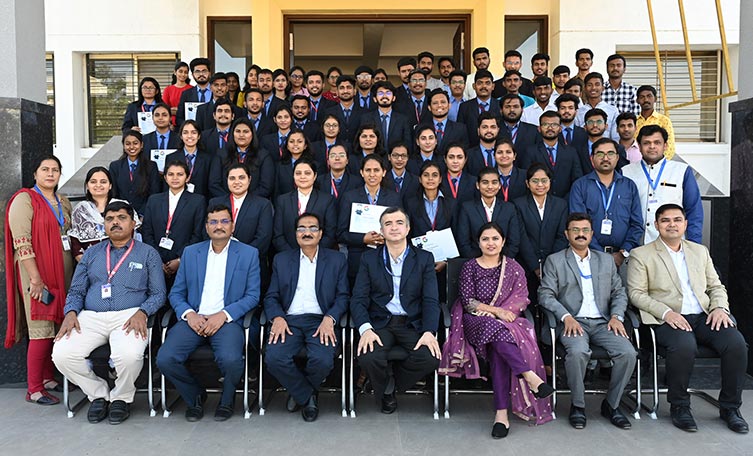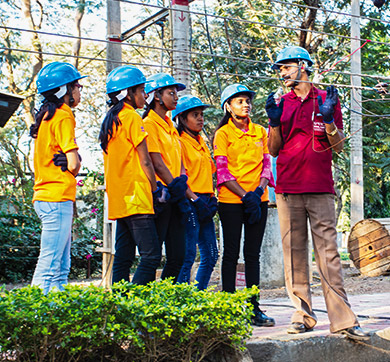January 2024 | 1251 words | 5-minute read
On completing her Bachelor’s in Computer Application, Khushali Prajapati, 21, hoped to make a career in web and graphic design. But she realised that she didn’t have the skills needed to get even an entry-level job in the field. Her parents, with their humble earnings, couldn’t fund another course.
So, when she heard of the Tata STRIVE Google Career Certificate Scholarship programme, she knew it was ‘God sent’. The programme financed her Google certificate course in UX design and she’s now employed at a web development company near her hometown in Gujarat.
The scholarship programme, a partnership between Tata STRIVE, a skill-development initiative of the Tata Community Initiatives Trust, and Google, is an initiative that aims to enable digital skilling among underserved graduates across India. Learners gain access to professional, employment-linked online training courses. They learn in-demand skills, are readied for careers in high growth fields, and connect with top employers.

“Digital skilling is the next big thing,” says Anita Rajan, Chief Executive Officer, Tata STRIVE. “With artificial intelligence, virtual reality, automation and so many other digital disruptions, the skilling ecosystem is changing. Today, there is a great penetration of technology across sectors and digital literacy is an imperative,” she adds, before citing the example for AC repair mechanics and welders who today also need digital skills to operate and repair smart equipment and machinery.
Boosting digital skills
The programme offers multiple courses in high demand sectors, including data analytics, IT automation, UX design, IT support, and digital marketing and e-commerce. Since the start of the partnership between Tata STRIVE and Google in 2022, the scholarship programme has set thousands of students on the path to success. As of April 2023, 17,269 learners are enrolled in the programme; of these 44% are female, 27 are transgender, and five are cancer survivors (enrolled through a collaboration with Tata Memorial Hospitals). During the same time period, course competition certificates have been awarded to 10,470 learners. Tata STRIVE’s goal is to enrol 21,500 learners in the programme by December 2024.
All the Google courses are available on a global online learning platform. The duration of each course is typically between 180 and 240 hours and is offered to graduates with a background in IT. Additionally, learners get access to soft skills content and subject matter expert-led sessions. As the programme partner, Tata STRIVE collaborates with 278 state-run technical and engineering colleges and vocational institutes in, but not limited to, Mumbai, Pune, Nagpur, National Capital Region, Hyderabad, Kolkata, Chennai and Bangalore, to help mobilise and enrol underserved students in the scholarship programme. Students undergo a vetting process and those selected are given no cost enrolment to the Google Career Certificate course of their choice.
“Google’s ambition to scale up their digital learning module and offer it for free would not be possible by simply scaling physical learning centres,” says Ms Rajan. “With our network and experience in skill development, and reach as a Tata brand, we are able to offer Google a win-win partnership.”
Striving to do better
Despite the boom during the pandemic, online courses tend to have a low completion rate — the global average is 10-12%. Tata STRIVE identified this as a cause for concern and added interactive sessions with subject matter experts (SMEs) on top of the bouquet of Google courses to educate learners on on-ground realities, but more importantly to drive and sustain their interest. Tata Consultancy Services is one of the key SME partners and, to date, Tata STRIVE has conducted 20+ SME sessions in collaboration with the company.
As part of each course, Tata STRIVE also offers its online Youth Development Module (YDM) to all learners. Developed internally, the module includes soft skills courses that help cultivate and nurture behavioural components such as attitudes, emotions, values and motivation that are essential to get and sustain jobs.
A key factor that has increased enrolment numbers has been the close collaboration with educational institutes, skill development centres, and NGOs. Core members of the Tata STRIVE team liaise with faculty members and enrol students through dedicated workshops, promotion of certificate distribution ceremonies in institutes and targeted communication campaigns. The contribution of educational institutes is significant towards a higher course completion and certification rate. “We get former students who have completed the course to come and talk about their experience and reiterate how the certification helps,” says Rajarshi Mukherjee, Principal Lead – Partnerships, Tata STRIVE.
This continuous and deep collaboration is driven by a dedicated team that conducts regular meetings with educational institutes, monitors enrolment, organises SME sessions and keeps the communication flowing. As a result, several institutes have assigned a SPOC to help implement and monitor the programme internally.
Leading through technology
While Tata STRIVE’s skilling programmes have typically focused on faculty-led training in classrooms, the pandemic reshaped its approach.
The organisation introduced blended learning programmes, which included digital learning, across the board. It also developed a technology-led MIS system that digitised every aspect of the skill development value chain.
“The combination of self-learning and experience sharing sessions, supported by a guided near real-time tracking model, has proven to be highly effective in the realm of digital skilling courses,” says Raghu Reddy, Principal Lead – Technology, Tata STRIVE. “Fully automating the entire value chain, capturing interest, enrolment, certification, and placement, along with providing near real-time progress visibility, has empowered the programme team to concentrate their efforts where they are most required. Moreover, it optimises resources and generates a greater impact. We have enabled this scalable end-to-end visibility solution through seamless integration of multiple technology platforms.”
Course overview
Duration: 180-240 hours of domain courses and 21 hours of Tata STRIVE’s Youth Development Module
Mode of learning: Recorded videos and assessments hosted online, SME sessions with industry experts and the Youth Development Module
Assessment: MCQ-based quizzes
Certification: From Google and Coursera on completion
Placement assistance: Tata STRIVE’s in-house placement team
—Sanghamitra Bhowmik
































